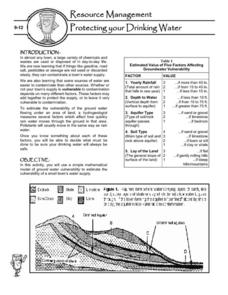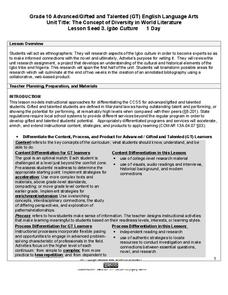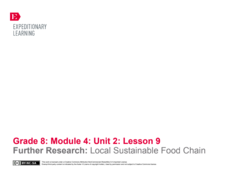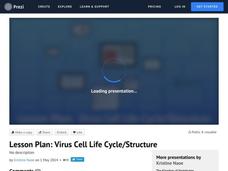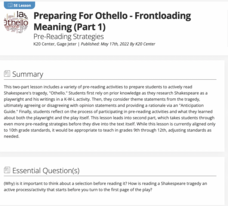Stanford University
Japan and America
When Commodore Matthew Perry sailed to Japan and demonstrated American naval strength, he forced the empire to engage in trade with the United States. How did this new, strong-armed relationship influence both parties? Pupils consider...
Stanford University
Chinese Immigration and Exclusion
The Chinese Exclusion Act was the first race-based restriction on immigration in American history. Why was the act passed after Chinese immigrants helped build the Transcontinental Railroad? A series of documents, including speeches and...
National Endowment for the Humanities
Edgar Allan Poe, Ambrose Bierce, and the Unreliable Narrator
Stories by Edgar Allan Poe and Ambrose Bierce provide readers with an opportunity to investigate unreliable narrators. The lesson plan begins with an activity about different types of point of view and continues as scholars apply their...
Alabama Department of Archives and History
How Two Alabamians Remembered Slavery Years Later
Designed to help readers recognize the point of view of the author of a primary source documents and analyze how that point of view influences the reliability of a text, young historians examine two personal letters, one written by...
Curated OER
Savvy Surfers: Website Evaluation and Media Literacy
Sixth graders strengthen their understanding of what a high quality website is composed of. Learners evaluate three websites for accuracy, credibility, and reliability by completing a chart.
PBS
How to Teach Your Students about Fake News
What media literacy skills do people need to evaluate a news source? Scholars listen to and discuss an NPR story about how fake headlines often dupe young people and adults alike. Next, they study news stories, using a fact-checking...
Curated OER
Pioneering Principles: Why Character Matters
What does it mean to "be of good character"? What are the qualities that define such a person? The 1825 Colonization Law of Coahuila y Texas required that all new immigrants into Mexican Texas present documentation that they were of good...
Curated OER
Political Campaign Ads
During a political campaign, you can hardly turn around without encountering an endorsement or attack on a candidate. High schoolers examine the ways that negative advertisement, positive advertisements, and everything in between can...
American University
Factitious
Truth or factitious? Users of an engaging interactive test their ability to identify whether an article is real or fake news.
Stanford University
Boston Massacre
The Boston Massacre was a propaganda victory for those protesting British rule over the American colonies. By using images from Patriots, as well as the testimony of witnesses, scholars consider what may have happened on that fateful day...
Nemours KidsHealth
Media Literacy and Health: Grades 9-12
An essential skill for 21st-century learners is to know how to find reliable sources of information. Two activities help high schoolers learn how to determine the reliability of health-related news from websites, TV, magazines, or...
Curriculum Development Institute
Impact of Cultural Revolution
What is the role of primary and secondary sources in the study of history? How reliable are these different sources? As part of a study of the Chinese Cultural Revolution, class members examine a variety of resources and evaluate their...
US Environmental Protection Agency
Protecting Your Drinking Water
Having a clean, reliable source of drinking water is essential for any community, but in many cases this is easier said than done. Engage young environmentalists in exploring the five factors affecting vulnerability of a groundwater...
Maryland Department of Education
The Concept of Diversity in World Literature Lesson 3: Igbo Culture
What cultural concepts must readers understand in order to connect to Things Fall Apart? As part of their study of Chinua Achebe’s novel, class members research Nigeria and the Igbo culture to create a collaborative, web-based, annotated...
EngageNY
Further Research: Local Sustainable Food Chain
Researchers review how to create citations, find reliable sources, and paraphrase. Next, using guided task cards and their researcher's notebooks, they investigate the question they developed in instructional activity eight about the...
Curated OER
Fighting Fake News
Fake news. Alternative facts. Internet trolls. In an age of Newspeak, it's increasingly important to equip 21st century learners with the skills needed to determine the legitimacy of claims put forth on social media, in print, and in...
Historical Thinking Matters
Spanish-American War: 1 Day Lesson
After analyzing newspaper articles portraying different perspectives of the explosion of the Battleship USS Maine, your young historians will take a stand on which position is the most believable in both discussion and writing.
Newseum
Evidence: Do the Facts Hold Up?
Sometimes it's hard to escape bad information! Pupils learn the E.S.C.A.P.E. method for evaluating news sources and complete a worksheet to assess a news article using their new skills.
Newseum
E.S.C.A.P.E. Junk News
Fair, balanced, and reputable information? There's an acronym for that! Scholars learn the E.S.C.A.P.E. method for evaluating news sources. Then, pupils work in small groups to read and analyze a news story and discuss the activity to...
English Enhanced Scope and Sequence
Research Project Embedded with Media Literacy
Here is a phenomenal language arts lesson on media literacy for your middle and high schoolers. In it, learners produce a research product in the form of a public service announcement (PSA). First, they view examples of these PSA's to...
Prezi
Virus Cell Life Cycle/Structure
Viruses were nano before it was cool to be nano. The presentation covers the structure of a virus cell and the life cycle of a virus. It also includes two videos illustrating the virus cell in greater detail.
K20 LEARN
Preparing for Othello - Frontloading Meaning (Part 1): Pre-reading Strategies
The success of any lesson based on a complex text relies heavily on what instructors do before beginning the reading. Before reading Othello, scholars engage in a series of pre-reading activities, including completing an anticipation...
Serendip
Food, Energy and Body Weight
High schoolers learn why humans need calories, how they control weight with food choices, and the impact of exercise on energy. Scholars then apply their understanding to a case study of lunch choices and exercise.
K12 Reader
From Nomad to Farmer
The gradual evolution of the earliest settlers in North America from nomads to farmers is the subject of a reading comprehension worksheet that asks kids to answer a series of questions using information provided in the reading passage.














